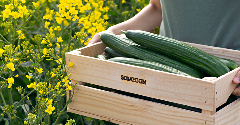News
Report: War in Ukraine leads to global food security and price crisis
3 Jun 2022
The war in Ukraine has resulted in a reduction in spring crop planting by at least one third and heavily disrupted supply routes, according to a report by the International Panel of Experts on Sustainable Food Systems.
As a result, not only is the Ukrainian population facing dire food security threats but the global agri-food markets are disrupted due to export restrictions, shortages and panic buying. While wealthier countries are experiencing the stresses on the global market in terms of spikes in food prices, poorer nations are seeing an exacerbation of pre-existing struggles with hunger.

Lack of access to food can lead to destabilised global conditions
Wheat, corn and sunflower oil are some of the major commodities that Ukraine and Russia produce. Ukraine alone is responsible for 14% of global corn exports, 15% of barley exports, 51% of sunflower-based vegetable exports and 14% of rapeseed oil exports. According to the International Panel of Experts on Sustainable Food Systems (IPES), over 30 countries depend on a combination of Russian and Ukrainian exports for at least 30% of their wheat import needs. Of that group, some 20 countries source over 50% of wheat imports from these markets.
The magnitude of these export bans has been emphasized by food export bans from countries including Indonesia, Hungary, Moldova, Serbia and Argentina. These bans further limit the sourcing opportunities for countries that are dependent on food imports.
In the past, food crises have sparked riots. Although such a response to the current climate is not so pronounced, there are minimal governmental safeguards to protect populations that are heavily dependent on staple food imports, according to the report.
Even wealthy countries are suffering under steep prices
However, these export-dependent countries are not the only ones that will struggle. Across the board, IPES found wheat export prices rose 20% between February and March of this year, hitting a 14-year peak. Maize reached the highest price levels since records began. Global food price indexes reached the “highest levels ever” on April 8, according to data from the UN Food and Agriculture Organization (FAO).
Part of the impetus driving such a sharp rise in prices is investors speculating on commodity futures. While supply disruptions are real, the report emphasized that “there is not a global food supply shortage at the present moment.”
The report pointed to speculators who buy and sell commodity futures contracts to make a profit as drivers behind this double-digit price growth. While future speculation provides liquidity to global commodity markets, excessive speculation can lead to swings in prices that are more pronounced than would have been the case based on supply and demand conditions alone. These futures prices eventually trickle down into real-world prices.
According to the report, this global destabilisation of food commodity markets is due to structural weaknesses in food systems. Pronounced reliance on fertilizer and fuel, as well as an interlinked system that does not prioritise local cropland, the cultivation of traditional, resilient crops or diversified food supplies has led to the current market where a conflict in one area can have consequences thousands of kilometres away.
Solutions to global food crises require structural changes
While the report noted the situation could deteriorate further if the ongoing war affects the summer harvesting of Ukrainian wheat, it did outline that fundamental change to our international food systems that encourage more self-sufficiency and reliance on local production could help avoid other future food crises.
The report concluded: “failure to [make changes] means sleepwalking into the catastrophic and systematic food crises of the future”.
Related news

Soy story: WWF scores UK supermarkets on sustainability efforts
12 Nov 2025
WWF has published its latest “Soy Scorecard”, ranking UK supermarkets’ efforts to combat deforestation and land conversion in their soy supply chains.
Read more
Standing Ovation and Bel scale up casein production from dairy co-products
11 Nov 2025
Foodtech company Standing Ovation has partnered with cheese specialist Bel Group to manufacture dairy serums for industrial-scale casein production via precision fermentation.
Read more
New UPF standard hoped to offer consumers ‘coherence and clarity’
10 Nov 2025
Ingredients companies are being urged to enter “a new era of partnership and innovation” following the launch of the industry’s first non-UPF verification scheme.
Read more
Whistleblowers accuse UK meat industry of promoting cheap, unsustainable supply
7 Nov 2025
An anonymous group of industry insiders has accused the UK’s biggest food companies of systematically driving down meat quality and welfare standards.
Read more
Bord Bia presents Irish dairy ingredient suppliers at Fi Europe
6 Nov 2025
Dairygold Co-operative Society, The Carbery Group, and Ornua Co-operative: Meet with sustainable producers of Irish dairy ingredients at Food ingredients Europe 2025, Hall 7.2 Stand M18.
Read more
AI attraction means foodtech startups must ‘prove’ rather than ‘promise’
4 Nov 2025
Reports suggest that artificial intelligence (AI) is sucking investment from foodtech and agritech, but investors say the picture is complicated.
Read more
Penguin and Club bars no longer classed as chocolate
30 Oct 2025
Penguin and Club bars can no longer be classified as chocolate after the pladis-owned McVitie’s brands turned to cheaper alternatives amid the ongoing cocoa crisis.
Read more
Could plant-based protection replace plastic packaging?
29 Oct 2025
Swedish foodtech company Saveggy has launched an additive-free plant-based protection for cucumbers, offering a waste-free packaging solution for fruit and vegetables.
Read more
Does promoting protein content push up plant-based sales?
27 Oct 2025
Promoting the protein content of meat-free products is a more effective sales strategy than adding carbon labels, a study of UK bakery chain Greggs suggests.
Read more
Amazon Grocery launch aims to balance quality with affordability
22 Oct 2025
Global e-commerce giant Amazon has introduced a new private-label food brand, combining existing Amazon Fresh and Happy Belly products with new everyday items.
Read more